JunkScience.com
May 3, 2006
Oh boy... "Global
warming differences resolved with corrections in readings" - "WASHINGTON --A nagging difference
in temperature readings that had raised questions about global warming has been resolved, a panel of scientists
reported Tuesday. "This significant discrepancy no longer exists because errors in the satellite and
radiosonde data have been identified and corrected," researchers said in the first of 21 assessment reports
planned by the U.S. Climate Change Science Program." (AP)
It'd be nice to think this is simply a case of misreporting but somehow we suspect not. This is going to
take a little untangling so readers should grab that coffee now and make themselves comfy -- we'll wait. ...
Ready? Alright then -- the opening para above begins with the "resolution of nagging differences", is
this new? Definitely not - flashback August 2005:
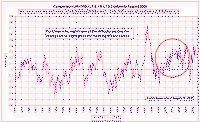 Mears and Wentz have presented The Effect of Diurnal Correction on Satellite-Derived Lower
Tropospheric Temperature [Abstract] [PDF]
[Supporting Online Material] - this is not
the work which resulted in adjustment of the UAH MSU LT dataset. (More information in California
group's answer to climate puzzler improves the accuracy of global climate data from the team at UAH and
a visual comparison of the 'old' and newly adjusted datasets is available by clicking the thumbnail at right.
Arguing the toss over a few hundredths of a degree may seem like nitpicking but it is a worthwhile tweak.) This
paper attempts to fit MSU measures to climate models and is basically about interpretation - it doesn't solve
anything but will likely liven up the discussion over satellite data interpretation.
Mears and Wentz have presented The Effect of Diurnal Correction on Satellite-Derived Lower
Tropospheric Temperature [Abstract] [PDF]
[Supporting Online Material] - this is not
the work which resulted in adjustment of the UAH MSU LT dataset. (More information in California
group's answer to climate puzzler improves the accuracy of global climate data from the team at UAH and
a visual comparison of the 'old' and newly adjusted datasets is available by clicking the thumbnail at right.
Arguing the toss over a few hundredths of a degree may seem like nitpicking but it is a worthwhile tweak.) This
paper attempts to fit MSU measures to climate models and is basically about interpretation - it doesn't solve
anything but will likely liven up the discussion over satellite data interpretation.
"Some Convergence of Global Warming
Estimates" - "In one of a trio of new global warming papers in Science, Mears & Wentz
(2005) address what they consider to be a large source of uncertainty in our (University of Alabama in
Huntsville, "UAH") satellite estimate for global lower tropospheric ("LT") temperature
trends since 1979. The satellite measurements come from the Microwave Sounding Units (MSUs) and Advanced
Microwave Sounding Units (AMSUs) flying on NOAA's polar orbiting weather satellites. The UAH estimate of the
globally averaged trend since 1979 to the present has been +0.09 deg. C/decade, considerably below the surface
thermometer estimate that has been hovering around +0.20 deg. C/decade for the same period of record. This
discrepancy between the UAH satellite LT trends and the surface thermometer trends has caused some
consternation, since what we understand of atmospheric physics suggests that sustained warming at the surface
should be amplified with height in the troposphere, not reduced." (Roy Spencer, TCS)
Tweaks in data are nothing new, in fact, Roy Spencer is currently working on adjustments for satellite drift or
was as at the 6th of April:
Roy is working on a diurnal adjustment for the AMSU instruments as they have now drifted over an hour from
their initial crossing time. NOAA-15 has backed up from 7:30 to 5:48 and NOAA-16 has drifted forward from 1:54
to 3:10. Be on the lookout for a new version that will have these additional adjustments.
There is also a divergence between NOAA-15 and NOAA-16 that has developed in the last 12 months. We don't know
if N15 is spuriously warming or N16 is spuriously cooling. As soon as this is resolved, we hope to include this
correction in the next version as well.
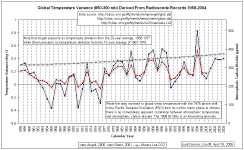 Whether there has or has not been an adjustment or possible minor trend error located in radiosonde records
due to the manner in which instrument packs are/were shielded from sun exposure is of no particular comfort to the
Global Warming industry either. The significant warming in the record is a step shift concurrent with the 1976 PDO
phase shift. Could accumulating greenhouse gases cause a sudden atmospheric warming in one year but not the
preceding or following years? We are not aware of any sudden widespread change in radiosonde instrumentation that
could cause such a step in an otherwise largely trendless record.
Whether there has or has not been an adjustment or possible minor trend error located in radiosonde records
due to the manner in which instrument packs are/were shielded from sun exposure is of no particular comfort to the
Global Warming industry either. The significant warming in the record is a step shift concurrent with the 1976 PDO
phase shift. Could accumulating greenhouse gases cause a sudden atmospheric warming in one year but not the
preceding or following years? We are not aware of any sudden widespread change in radiosonde instrumentation that
could cause such a step in an otherwise largely trendless record.
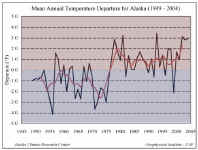 The next question to ask then is "Is there any supporting evidence such a temperature shift actually
occurred?" At right we have the Alaskan surface record classically highlighting the effect of the PDO phase
shift. There is no plausible means by which accumulating greenhouse gas could effectively act as a major surface
warming agent in one year but not in the preceding or subsequent years.
The next question to ask then is "Is there any supporting evidence such a temperature shift actually
occurred?" At right we have the Alaskan surface record classically highlighting the effect of the PDO phase
shift. There is no plausible means by which accumulating greenhouse gas could effectively act as a major surface
warming agent in one year but not in the preceding or subsequent years.
So, while tweaks and adjustments are certainly made to the
various records the "resolution of discrepancies" between near-surface and atmospheric datasets is
probably more a case of wishful thinking by Big Warming than it is of scientific fact. In fairness, it is only an
order of magnitude and we are talking the difference between hundredths of a degree per decade as opposed to
tenths of a degree per decade, with the sum total of all presumed warming being within the margin of error in our
ability to estimate the planet's mean temperature.
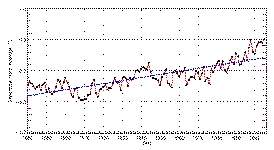 Some people have difficulty with what they view as our disregard of "massive warming" so we'd better
point out that it is not us but the very same National Climatic Data Center, whose director is the alleged source
of some of the quotes in the above article, that hosts and provides the interface to the very datasets that show
global warming trends of an insignificant 0.5 °C or less per century. Time series: Temperature
January-December, 1880 - 2005 GHCN-ERSST
Data Set: Global Trend: 0.04 °C/decade. Some regional and some likely Urban Heat Island-contaminated
series certainly show significant warming and some show significant cooling but the global trends are truly
trivial.
Some people have difficulty with what they view as our disregard of "massive warming" so we'd better
point out that it is not us but the very same National Climatic Data Center, whose director is the alleged source
of some of the quotes in the above article, that hosts and provides the interface to the very datasets that show
global warming trends of an insignificant 0.5 °C or less per century. Time series: Temperature
January-December, 1880 - 2005 GHCN-ERSST
Data Set: Global Trend: 0.04 °C/decade. Some regional and some likely Urban Heat Island-contaminated
series certainly show significant warming and some show significant cooling but the global trends are truly
trivial.
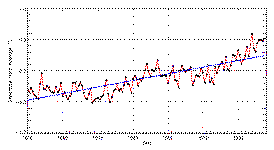 Time series: Temperature January-December , 1870 - 2005 HadCRUT2v
Data Set Global Trend: 0.05 °C/decade.
Time series: Temperature January-December , 1870 - 2005 HadCRUT2v
Data Set Global Trend: 0.05 °C/decade.
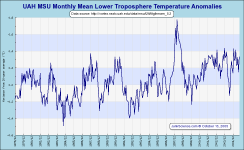 Does data from satellite-mounted MSUs suggest some atmospheric warming? Yes it does, although not as much as
near-surface data and not with any apparent direct relationship to atmospheric greenhouse gas measurements.
Does data from satellite-mounted MSUs suggest some atmospheric warming? Yes it does, although not as much as
near-surface data and not with any apparent direct relationship to atmospheric greenhouse gas measurements.
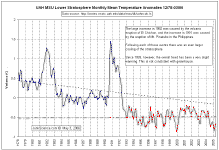 While the assertion that there has been an observed stratospheric cooling is technically correct, it has not
true to say it is consistent with the enhanced greenhouse hypothesis. Under enhanced greenhouse, as the optical
depth of the lower troposphere increases with additional greenhouse gases there should be a warming of the
troposphere and associated cooling of the stratosphere. Indeed there has been an overall stratospheric cooling --
in stepwise fashion following major explosive volcanic events -- but the trend since 1993 has been a slight
warming and is thus of the wrong sign to support the hypothesis.
While the assertion that there has been an observed stratospheric cooling is technically correct, it has not
true to say it is consistent with the enhanced greenhouse hypothesis. Under enhanced greenhouse, as the optical
depth of the lower troposphere increases with additional greenhouse gases there should be a warming of the
troposphere and associated cooling of the stratosphere. Indeed there has been an overall stratospheric cooling --
in stepwise fashion following major explosive volcanic events -- but the trend since 1993 has been a slight
warming and is thus of the wrong sign to support the hypothesis.
Finally, the assertion is made: "The observed patterns of change over the past 50 years cannot be
explained by natural processes alone." Um... no. What they mean is their climate models so inadequately
model the atmosphere and the planet's climate that the models can't explain the warming without the
additional fudge parameters of anthropogenic factors -- that's a horse of an entirely different colour, operating
under the assumption that the world is wrong and the models are right and that imaginary factors need be applied
to balance the books.
As we said originally, we hope this is really lousy reporting -- otherwise climate science is in even
worse shape than we thought.